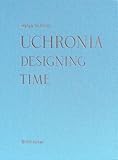Uchronia : Designing Time / Helga Schmid.
Material type: TextPublisher: Basel : Birkhäuser, [2020]Copyright date: ©2020Description: 1 online resource (256 p.)Content type:
TextPublisher: Basel : Birkhäuser, [2020]Copyright date: ©2020Description: 1 online resource (256 p.)Content type: - 9783035618105
- 9783035618112
- 745.4 23
- MLCM 2022/41335 (B)
- NK1520 .S36 2020
- online - DeGruyter
- Issued also in print.
| Item type | Current library | Call number | URL | Status | Notes | Barcode | |
|---|---|---|---|---|---|---|---|
 eBook
eBook
|
Biblioteca "Angelicum" Pont. Univ. S.Tommaso d'Aquino Nuvola online | online - DeGruyter (Browse shelf(Opens below)) | Online access | Not for loan (Accesso limitato) | Accesso per gli utenti autorizzati / Access for authorized users | (dgr)9783035618112 |
Frontmatter -- CONTENTS -- Foreword -- Introduction -- Key Terms -- CHAPTER 1: UCHRONIA OR DYSCHRONIA -- CHAPTER 2: UCHRONIAN THINKING -- CHAPTER 3: UNLEARNING TIME -- CHAPTER 4: UCHRONIA WORKSHOPS -- CHAPTER 5: TIME COMMUNITIES -- CHAPTER 6: CIRCADIAN TEMPORALITY -- CHAPTER 7: THE POTENTIAL OF UCHRONIA -- UCHRONIA MANIFESTO -- Glossary -- The Author -- Thank You -- Images -- Notes -- Bibliography -- Impressum
restricted access online access with authorization star
http://purl.org/coar/access_right/c_16ec
What time is it? Why should we care? This book critically investigates our contemporary time crisis. The transformation of society from an agrarian to an industrial, and finally an urbanized way of living and working has created a fundamental change in our understanding of time: a 24/7 mentality. The move from natural time to the digital age leads to a fragmentation of time that deeply affects our daily biological and social rhythm. We need a new approach to time to overcome our temporal system of clocks and calendars. This book investigates a new perception of time by exploring the concept of uchronia, a term derived from the Greek u-topos and meaning ‘no time’ or ‘non-time’. Uchronia is a way of questioning, speculating on and designing new kinds of temporal systems that are more about being in tune than on time.
Wie spät ist es? Wieso ist das von Bedeutung? Dieses Buch setzt sich kritisch mit unserer heutigen Zeitkrise auseinander. Die Transformation der Gesellschaft von einer agrarischen zu einer urbanisierten Lebens- und Arbeitsweise hat einen fundamentalen Wandel unseres Zeitverständnisses erzeugt: es wird mehr und mehr von einer 24/7 Mentalität geprägt. Der Weg von der natürlichen Zeit bis ins digitale Zeitalter führt zu einer Fragmentierung von Zeit, die tief in unseren täglichen biologischen und sozialen Rhythmus eingreift. Wir brauchen neue Ansätze, um das gegenwärtige System von Uhren und Kalendern zu überwinden. Dieses Buch untersucht neue Wahrnehmungsweisen von Zeit, indem es das Konzept von U-Chronia entfaltet, das vom griechischen Begriff ou-topos hergeleitet ist und „Keine Zeit!" oder „Nicht-Zeit" bedeuten kann.
Issued also in print.
Mode of access: Internet via World Wide Web.
In English.
Description based on online resource; title from PDF title page (publisher's Web site, viewed 27. Jan 2023)


